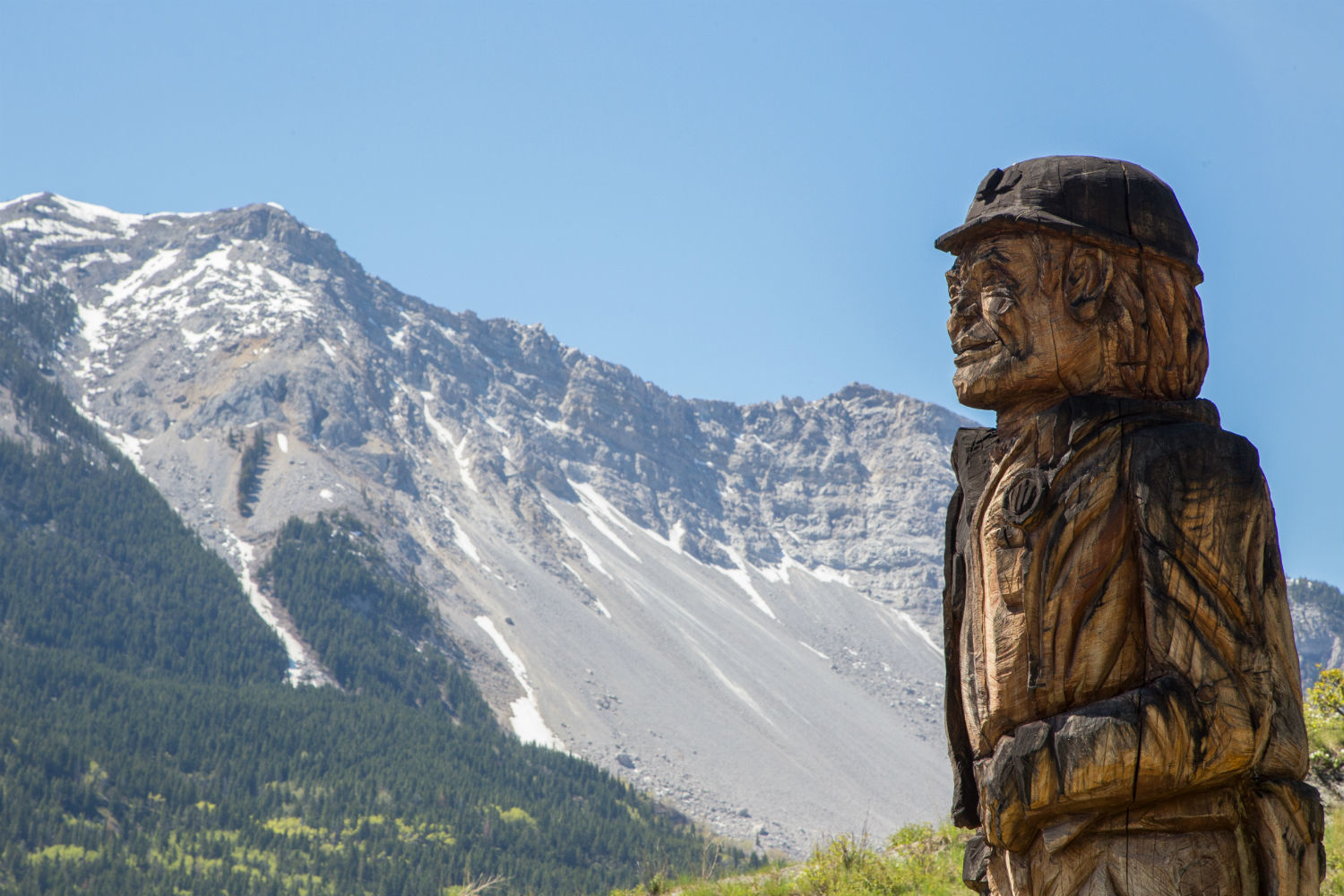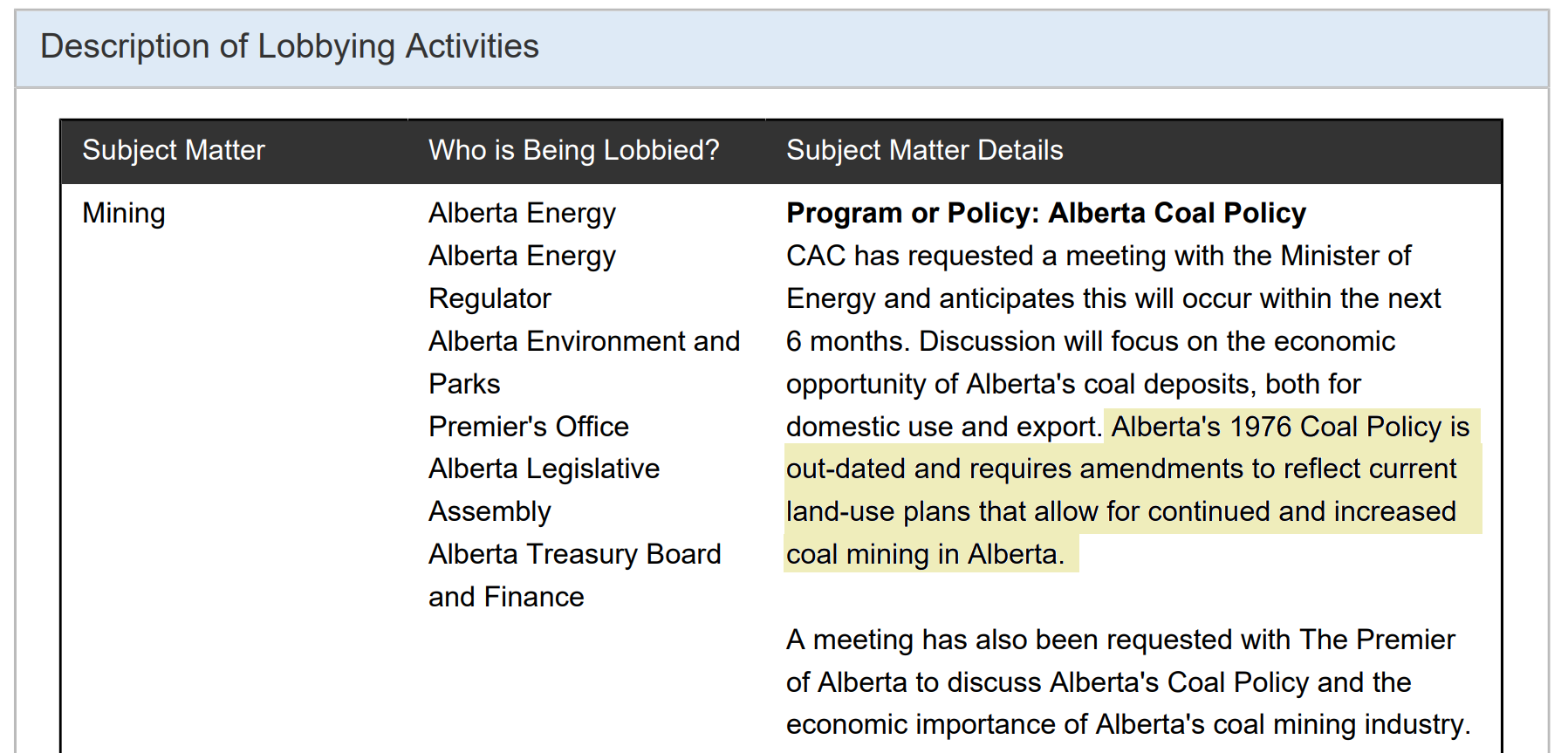BACKGROUNDER
In a desperate economic moment, Alberta is abruptly reshaping a decades-old balance in the Rockies and Foothills, chasing opportunity in the volatile market of coal exports, at the risk of the very land that defines the province and its people.
By Robson Fletcher, Drew Anderson and Jordan Omstead
July 7, 2020
EXCERPT LONG READ FEATURE

Digging into the coal lobby
When asked why the coal policy was unceremoniously rescinded by the current government, some critics, including the previous NDP environment minister Shannon Phillips, are quick with an answer: lobbying.
The filings in Alberta's lobbyist registry offer a glimpse into what went down in the halls of power, and how it changed over time.
The online registry dates back to 2017 and a reading of all records that mention "coal" reveals a noticeable uptick in access for the Coal Association of Canada after the election of the United Conservative Party in the spring of 2019. Prior to that, there are no records of the coal association securing meetings with any cabinet ministers under the NDP government.
Robin Campbell’s name appears often in those documents. After serving as finance minister and environment minister under previous Progressive Conservative governments in Alberta, he’s now head of the coal association.
Just over a month after the UCP won the election, lobbying records show Campbell met with the new environment minister, Jason Nixon, to discuss “economic opportunities for the Province of Alberta as a result of proposed coal mining activity, primarily in the Eastern Slopes [of the Rocky Mountains].”
Three days later, the coal association met with the deputy energy minister to try and amend the 1976 coal policy to encourage development on those eastern slopes. Soon, records show there were meetings with the minister of Indigenous relations to discuss consultation, requests for a meeting with the premier, another get-together with Nixon and with his department, a meeting with the minister of red tape reduction and a presentation to the UCP's energy caucus.

The coal association then met with Energy Minister Sonya Savage by teleconference on April 30 to discuss the coal policy, among other topics. Just over two weeks later, the government announced, via a news release issued the Friday afternoon before the May long weekend, that it would rescind the 44-year-old policy.
Since that release, which trumpeted flexibility for industry, the continued protection of sensitive lands and the arrival of modern oversight to attract new investment, the government has declined interview requests about the coal policy.
In response to inquiries, its spokespeople have pointed to official statements saying all environmental regulations remain in place and the same regulatory processes applied to other industries will now be applied to coal.
But what the government didn’t highlight in its statements, and what it hasn’t discussed since, is the removal of those Category 2 prohibitions against open-pit mining in vast stretches of the Rockies and Foothills.
Requests for interviews with Savage and Nixon, specifically, were rejected. Alberta Energy spokesperson Kavi Bal responded with a reiteration of the government's previous statements, along with a letter of support for the changes from the Piikani Nation in southern Alberta. Asked whether there was any consultation with any other organizations, Bal did not reply.
On June 3, Savage did tweet about the coal policy being rescinded. "We will continue to protect environmentally sensitive and recreational lands along Alberta’s Eastern Slopes while addressing the continued and growing demand for high quality metallurgical coal," she said, referring to the steel-making type of coal found in the mountains.
Campbell, with the Coal Association of Canada, also did not respond to an interview request for this article, but did speak with CBC News shortly after the policy change was announced. At that time, he celebrated the government's new direction, which he said would clear the way for more coal projects in areas where it was previously difficult to mine.
"For example, around Rocky Mountain House, we have a couple of projects that were on Category 2 lands. This now allows them to move forward,” he said. “It allows them to go out and raise money in the international community. And it allows them to start building an operation, which is going to create jobs."
While it was possible in the past for companies to apply for an exemption to the coal policy's restrictions, Campbell said it was cumbersome and rescinding the policy outright would remove a major barrier to investment. He said "at least a half a dozen" companies are currently looking at developing mines on lands where it would have been previously prohibited and "there will be more."
"Coal's not going away,” he said, “as much as some people like to think it is."
No comments:
Post a Comment